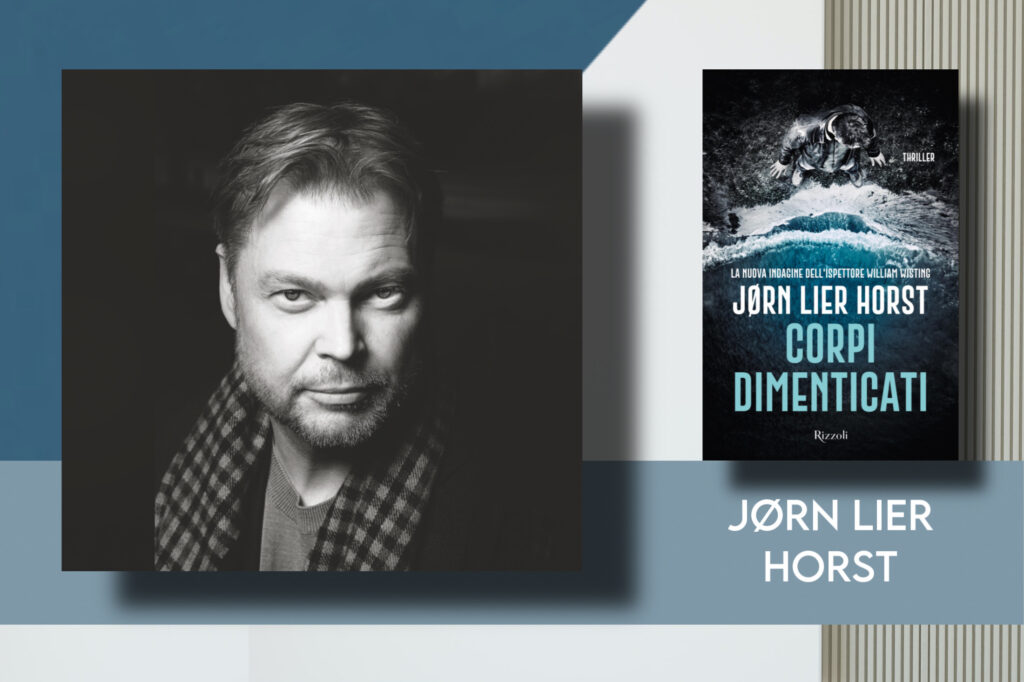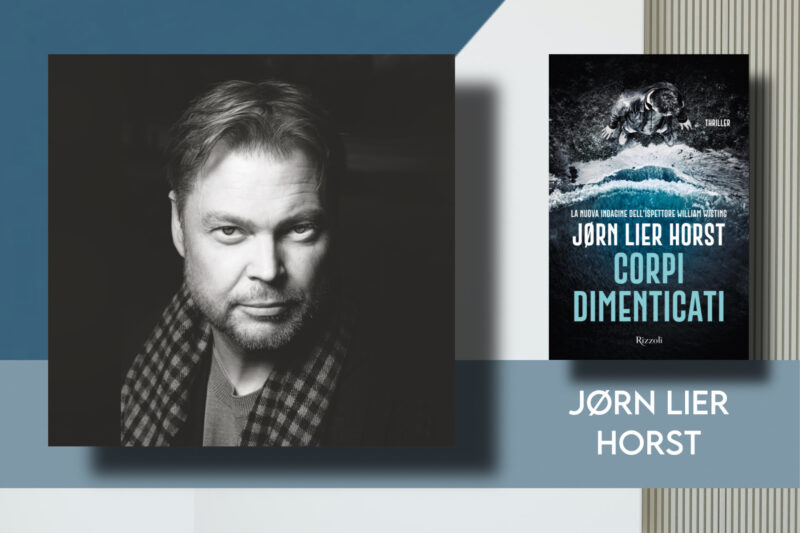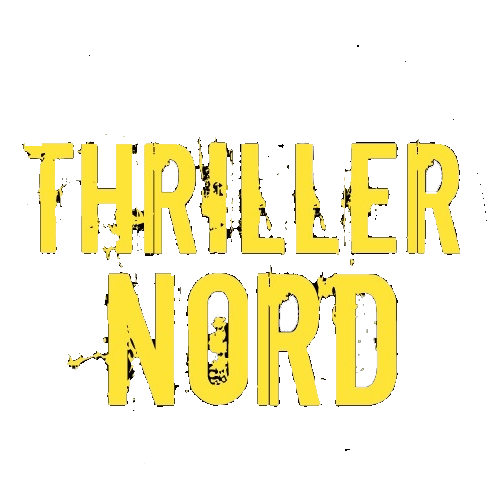A tu per tu con l’autore
Quanto è stato importante avere lavorato nella polizia ai fini dell’ideazione delle indagini che vedono protagonista William Westing?
Considero l’essere stato un investigatore per quasi vent’anni la mia forza come scrittore di crime. Le forze di polizia forniscono un’eccellente posizione di vantaggio per osservare la società, e anche un ottimo punto di partenza per scrivere crime fiction realistica – perché prima o poi, gli aspetti inefficienti della nostra società finiscono sul piatto della polizia.
Ho lasciato la polizia nel settembre 2013 dopo quasi 20 anni di servizio. Le esperienze derivanti dal vero lavoro di polizia mi hanno in molti sensi plasmato come essere umano, e tracce di questo sono visibili nei miei libri. Il mio lavoro di investigatore capo mi ha permesso di andare oltre i nastri e camminare attraverso i resti e le tracce di gravi crimini. Vedere i resti di una lotta disperata. Entrare in stanze rimaste chiuse e che contengono segreti inesplorati. Ecco dove mi piace portare i lettori. una parte del mio lavoro era arrivare a conoscere assassini e stupratori, per calarmi nel loro modo di pensare. parlare con vittime di crimini e le loro famiglie. Trovarmi faccia a faccia con la rabbia, il dolore, la disperazione e il rimorso delle persone è stato di gran valore per me. Mi ha insegnato molto della vita. Mi ha fornito una visione sfumata del crimine, dei criminali e delle vittime. Insomma, credo abbia contribuito alla creazione di un tono autentico nei miei libri che in termini generali è probabilmente difficile da imitare, e dato loro una sensazione di true crime.
How much importance has working as a policeman had to design William Westing’s investigation?
I consider being an investigator for almost 20 as my strength as a crime writer. The police force provides an excellent vantage point for observing society, as well as an excellent starting point for writing realistic crime fiction – because sooner or later, the ineffective aspects of our society end up on the police’s plate.
I left the police in September 2013, after nearly 20 years of service. Experiences from the real police work has in many ways has shaped me as a human being, and traces of that is visible in my books. My work as chief investigator allowed me to go behind the barrier tapes and to walk among the remains and traces of sever crimes. See the remains of a relentless struggle. Stepping into rooms that has been closed and contains unexplored secrets. That’s where I like to bring readers. A part of my job was getting to know the killers and rapists, to put me into how they think. Talk to crime victims and their families. Standing face to face with other peoples anger, grief, despair and remorse have been valuable for me. It has taught me a lot about life. It has given me a nuanced view of crime, criminals and crime victims. In sum, I think it has contributed to the creation of an authentic tone in my books that in general terms it is probably difficult to imitate. Given them a sense of ‘true crime’.

C’è qualcosa di Jørn Lier Horst, dal punto di vista umano o caratteriale, nel personaggio di William Wisting?
Quando ho creato questo nuovo eroe del crime norvegese ero molto consapevole di come sarebbe dovuto essere. Ero stanco di leggere di investigatori nordici che da soli risolvono casi di omicidio mentre sono ubriachi, che si svegliano la mattina grattandosi la barba di tre giorni e con una bottiglia di whisky pronta sul comodino. Volevo un eroe crime che fosse più simile al poliziotto che conosco attraverso il mio lavoro. è venuto fuori William Wisting, un poliziotto giusto ed esemplare, ma soprattutto un essere umano decente e genuino.
Penso che una delle responsabilità più significative che pesano sulle spalle di uno scrittore di polizieschi sia la rappresentazione del lato interpersonale. In Corpi Dimenticati e i romanzi precedenti, quindi, non ho solo a che fare con il modo in cui Wisting affronta un caso e come lo risolve, ma anche con l’impatto che il caso ha su di lui. Wisting cambia da un libro all’altro. E’ diventato vedovo e i figli gemelli Line e Thomas sono cresciuti accanto a lui.
Allo stesso tempo provo anche a mostrare che il lavoro di detective è uno sforzo collettivo. Ci sono vari investigatori che contribuiscono con diverse qualifiche, conoscenze e abilità. quello che hanno in comune è un eterno dubbio. L’incertezza di aver fatto la cosa giusta, di aver fatto tutto, se ci sia niente che abbiano trascurato. Conosco quel fastidio molto bene.
Is there something of Jørn Lier Horst in William Wisting’s character?
When I created this new, Norwegian crime hero, I was very conscious of how he should be. I was tired of reading about nordic investigators who single-handedly solved murder cases while they were drunk, waking up the next morning scratching their three days old beard and having a whiskey bottle standing ready on the nightstand. I wanted a crime hero who was more like the policeman who I know from my work. It turned out to be William Wisting, a fair-minded, exemplary policeman but above all a decent and genuine human being.
I think one of the most significant demands resting on the shoulders of a writer of police procedurals is the depiction of the interpersonal. In The Caveman (Corpi dimenticati) and the previous novels, therefore, do not merely deal with how Wisting tackles a case and how he solves it, but also the impact the case has on him. Wisting changes from one book to the next. He has become a widower and the twin children Line and Thomas have grown up around him.
At the same time I also try to show that detective work is a collective task. There are various investigators who contributes with different qualifications, knowledge and abilities. What they have in common is an eternal doubt. An uncertainty if they have done the right thing, if they have done everything and if there is anything they may have overlooked. I know that nagging feeling well.
Come nascono i suoi romanzi? Sono frutto di una meticolosa programmazione oppure nascono e quindi si sviluppano “in divenire”?
Una volta scrivevo i miei romanzi in Excel prima che in Word. Usavo il foglio di calcolo per delineare la trama e fare un abbozzo delle mie storie. Ogni colonna un capitolo, nelle celle scrivevo le parole chiave per le azioni, e avevo alcune righe in cui tenevo traccia di dove mi trovo come tempi e luoghi. Questo approccio analitico è un tratto che deriva dal mio lavoro di investigatore, dove c’è molto di cui occuparsi e strutturare. La struttura schematica è molto d’aiuto quando tutti i piccoli tasselli di un romanzo giallo devono collimare. Poi però durante la stesura accadono cose. La storia va in direzioni differenti da quelle pianificate, e compaiono nuovi personaggi. In questo modo, le storie prendono vita.
Oggi sono molto più sicuro della mia scrittura e non scendo così in dettaglio prima di cominciare un nuovo progetto. Mi piace avere 4 o 5 punti fermi che includeranno la trama, poi imbastisco la storia in corso d’opera. Alcuni anni fa ho cominciato a usare il programma di scrittura Scrivener, che è molto utile. Lì tutti i pensieri sparsi che vengono in mente possono essere annotati e recuperati all’occorrenza. E’ sia uno strumento di scrittura che un database di ricerca.
How were your novels born? Do you design everything in detail or do you prefer to just “follow” the investigation as it proceeds?
I used to write my books in Excel before I wrote in Word. I use the spreadsheet to plot out and make a sketch of my stories. Each column was a chapter, and in the cells, I wrote keywords for the action, and I had some rows where I kept track of where I was in time and place. This analytical approach was a trait brought with me from work as an investigator, where it is much about being targeted and structured. But the schematic structure was helpful when all the little cogs in a crime novel have to fit into each other. But then things happened during the writing process. The story went in directions different than planned, and new people popped up. In that way, the stories come alive.
Today, I am very confident in my writing and do not go into detail before starting a new project. I like to have 4-5 bars that I know I will include in the plot, then I stitch the story together in the process. A few years ago, I started using the writing program Scrivener, which is very useful. There, all loose thoughts that come up can be noted down and retrieved when I have a use for them. Is both a writing tool and a research database.
C’è qualche autore del passato (Esempio A. Conan Doyle, Agatha Christie, George Simenon o altri) dal quale ha tratto ispirazione?
Ho letto tutti i vecchi maestri come Conan Doyle, Agatha Christie, George Simenon, ma probabilmente non sarei lo scrittore che sono senza il compianto scrittore svedese Henning Mankell. Probabilmente non sarei nemmeno stato lo stesso poliziotto. Il mio primo incontro con Mankell fu il primo romanzo di Kurt Wallander. Il Killer senza volto, pubblicato in norvegese nel 1993. Lo lessi durante i miei studi all’accademia di polizia e pensai che quello era il tipo di poliziotto che volevo essere. Un detective buono e giusto che conduceva il lavoro con casi maggiori. Così Mankell-Wallander hanno condotto la mia carriera verso il ruolo che ho ricoperto per molti anni di capo investigatore della polizia, e lasciato in questo modo un’influenza duratura.
Is there any author from the past (like A. Conan Doyle, Agatha Christie, George Simenon or others) you were inspired by?
I have read all the old masters as Conan Doyle, Agatha Christie, George Simenon, but I would probably not have been the writer I am without the late Swedish writer Henning Mankell. I probably would not have been the same policeman either. My first encounter with Mankell was the first novel about Kurt Wallander. Faceless Killer, published in Norwegian in 1993. I read it during my studies at the Police Academy and thought it was such a policeman I would be. An upright and good detective who led the work with major cases. Thus have Mankell / Wallander staked out my career to the role I had for many years as chief investigator for the police, and in that way left lasting impression.
Una domanda più ampia, lei è anche un autore di romanzi per ragazzi, secondo il suo parere che cosa serve per avvicinare i giovani alla lettura?
Questi libri arrivano come risultato della mia dedizione nel creare il piacere della lettura nei bambini e nei giovani. Con la serie CLUE e i libri sulla Detective Agency No. 2, avevo il desiderio di ricreare una parte del piacere semplice della lettura che ho provato da piccolo.
Questi sono libri scritti per bambini. Questo significa contenuto eccitante che vogliano leggere da soli. Il mistero mette i bambini intellettualmente alla prova, mentre la tensione li spinge avanti. Tutti possiedono una forza innata che ricerca l’equilibrio e la chiarezza di fronte al mistero. Una curiosità che forse è più forte nei bambini che negli adulti, e li spinge a continuare a voltare pagina.
In questo modo, un racconto giallo genera il desiderio di leggere. Il desiderio di leggere dà miglior comprensione delle parole, il che a sua volta contribuisce alla fluidità e migliori capacità di lettura. Man mano che migliori come lettore e il tuo vocabolario si espande, il tuo interesse nella lettura è ulteriormente stimolato, e i libri diventano non solo fonte di piacere, ma anche di conoscenza e comprensione. Ecco perché la lettura è importante. Aprire un libro significa aprire un mondo di possibilità: opportunità di esperienze nuove, nuove scoperte e comprensione. La lettura e la letteratura ci possono dare conoscenza e visione d’insieme. Più leggiamo, più sappiamo. E più sappiamo, più domande possiamo fare. Incoraggiando la nuova generazione alla lettura, creiamo una generazione più saggia e più ricca.
One more general question: as you also write books for children, what do you think is necessary to stimulate young people to read?
These books come as a result of my dedication to creating reading pleasure among children and young people. With the CLUE series and the books on Detective Agency No. 2, I had a desire to recreate some of the simple pleasure by reading as I experienced as a kid.
These are books written on children’s terms. That is, books with exciting content that they want to read themselves. The mystery challenges the kids intellectually, while the tension drives them forward. All people have an inherent power that seeks balance and clarity in the face of mystery. A curiosity that perhaps is stronger among kids than adults, and makes them keep turning the pages. In that way, a crime story generates a desire to read. The desire to read gives better comprehension of words, which in turn provides fluency in reading and better reading skills. As you become better at reading and your vocabulary increases, your interest in reading is stimulated further, and books become not only a source of pleasure, but also of knowledge and understanding. That’s why reading is important. To open a book, is to open a world of possibilities: Opportunities for new experiences, new discoveries and new insights. Reading and literature can give us knowledge and overview. The more we read, the more we know. And the more we know, the more questions we can ask. By encouraging the young generation to read, we also create a wiser and richer generation.
Intervista a cura di Bruno Balloni
Traduzione di Denise Antonietti
Acquista su Amazon.it:

